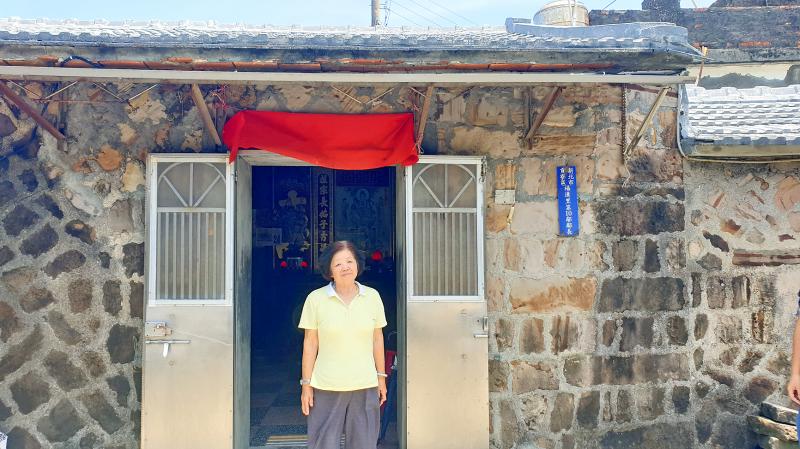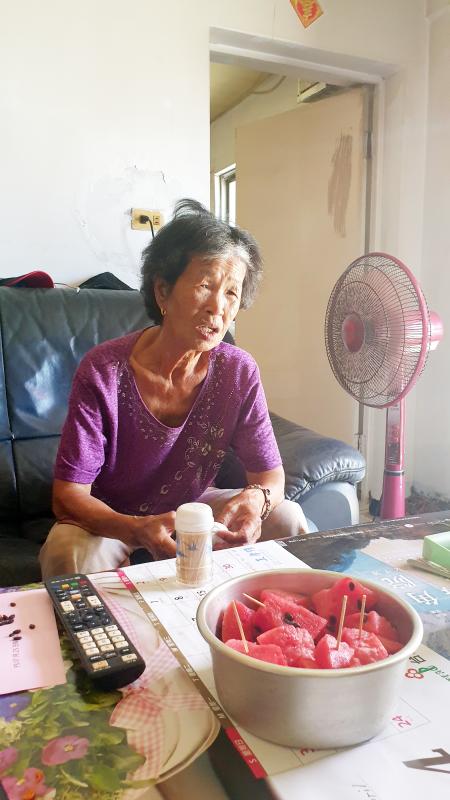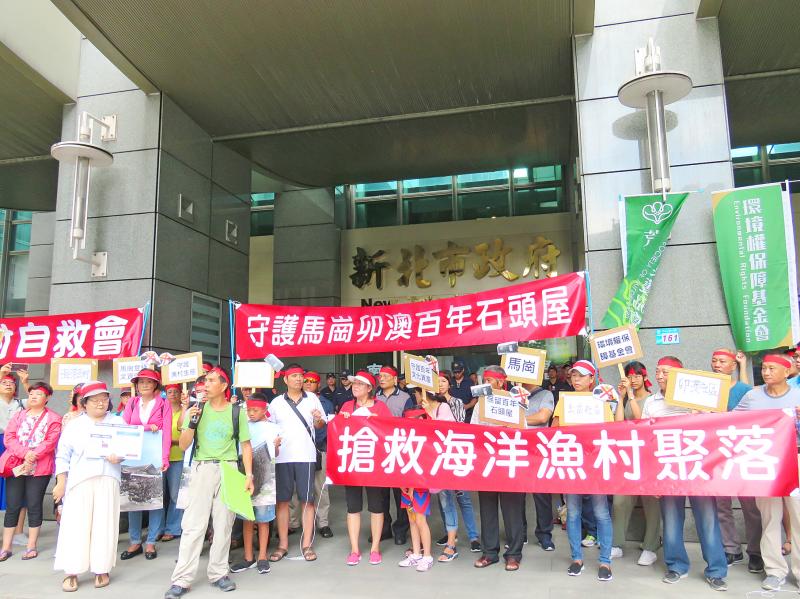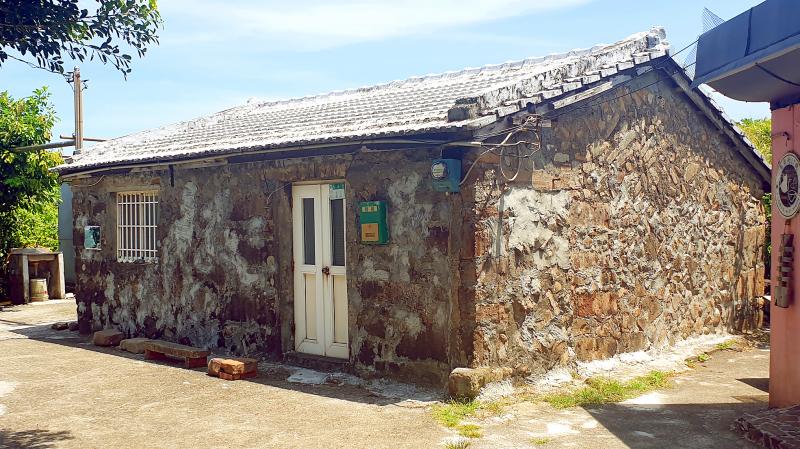Chen Wang-shi (陳罔市) doesn’t know where to go if she is forced to move. The 78-year-old Chen is an active “sea woman” (海女) in Taiwan’s easternmost fishing village of Makang (馬崗) in New Taipei City’s Gongliao District (貢寮). When the waves are calm, she ventures out to forage for algae, oysters and other edible marine morsels. She lives alone in the village, as her children have moved to the cities for work, returning for weekends and festivals.
“I cannot get used to living in Taipei, and I feel very uncomfortable if I don’t go out to the ocean to forage. I have too deep an emotional connection to this place. Even if it’s inconvenient, I like it here,” Chen tells the Taipei Times inside her home a minute’s walk from the ocean.
With about two-thirds of Makang acquired by developers, Chen belongs to 22 households who face eviction. While the court battles between the developers and residents continue, the villagers are trying to preserve Makang by applying to the government for cultural heritage status for a cluster of 100-year-old stone houses and its sea women culture.

Photo: Han Cheung, Taipei Times
So far, two of the houses have been designated as historical buildings, but New Taipei City’s Department of Cultural Affairs last August rejected Makang’s bid to list them collectively as a historic settlement.
Meanwhile, Yu Po-hsuan (游伯軒) and Yeh Kuei-hsien (葉貴嫻), two Taipei transplants who run a coffee shop in Makang, have been spearheading an effort to boost tourism, and Makang is a lot livelier on weekends than two years ago. They have also been emphasizing the area’s cultural heritage through guided tours and other activities.
“These developers often target remote places that escape the public eye,” Yu says. “That’s also their weakness; our goal is to let more people see and appreciate this place.”

Photo: Han Cheung, Taipei Times
The newfound attention has also instilled a sense of pride in the mostly elderly residents, who have lived here their whole lives and may not understand the significance of historical preservation.
“They now realize that the tourists actually like these stone houses and come take pictures of them on weekends. Now they are eager to tell people, ‘These are more than 100 years old,’” Yeh says.
FOSTERING LOCAL PRIDE

Photo: Han Cheung, Taipei Times
In the village’s heyday, 80-year-old Chiang-chen Pi-chu (江陳碧珠) and 50 other people lived in a four-sided residence with a stone courtyard. Today, she’s the only permanent resident left.
As a self-contained village, the land rights were never clearly recorded, and often confirmed by verbal agreement only. When the Japanese began implementing land registration policies in Taiwan, most villagers were illiterate or unfamiliar with the law, and for convenience’s sake they registered their land under a few individuals, who collected and paid the residents’ property taxes once per year.
Under the Chinese Nationalist Party (KMT), those who had the land registered in their names became the legal owners of a large portion of the village. Tu Yu-wen (涂右文), CEO of the Environmental Rights Foundation (環境權保障基金會), says that as a result, the developers were able to purchase so much of Makang by convincing these landowners to sell the property without first speaking to the people who lived on the land. Her foundation has been providing professional and legal help to the villagers in their struggle.

Photo: Han Cheung, Taipei Times
When the developers began suing villagers in 2018 to evict them, the murky land rights history worked against them, and several households have lost their cases.
“The law does not consider historical context or development, if you don’t have evidence, it’s very hard to win,” Tu says.
Ironically, about 30 years ago the government attempted to designate these stone houses as historical buildings, but the residents refused out of distrust toward the authorities. Last year, they helped block a government plan to build a yacht marina in neighboring Maoao (卯澳) village.
When three New Taipei City cultural heritage review committee members visited the village to inspect the two historical buildings, one of them suggested that the villagers also apply for historic settlement status, which is why Yu and Yeh are surprised that their bid was rejected. The city insists that the suggestion was just the opinion of that member.
The couple, who moved here in 2016 from Taipei for its rustic charm, says that they had to first convince the elderly population that this was a place worth protecting. Through promoting activities, exhibits and tours, plus the growing popularity of the Caoling Circle-line Bikeway which opened in 2011, tourists can now be seen frolicing in the waters of the intertidal zones and taking photographs of the stone buildings. Local vendors have also popped up, selling marine specialities along the streets.
“At first, they didn’t know that people would be interested in their way of life here,” Tu says “Only in recent years have they realized how special of a place they live in.”
PROTOCOL VIOLATION
The New Taipei City Department of Cultural Affairs rejected Makang’s bid for historic settlement on the grounds that many of the stone houses have been modified or remodeled with modern elements.
Weng Yu-chin (翁玉琴), the culture department’s chief secretary, says that the houses simply don’t qualify for the status due to their lack of uniformity. Weng gives Japan’s Shirakawago village as an example with its perfectly preserved clusters of thatched roof houses.
“The cluster in Makang is a hodgepodge of one-story and two-story houses, many with modern elements,” she says. “The collective history and appearance has been partially damaged. But we can still register the individual houses that are preserved well.”
Currently there are only 18 historic settlements across Taiwan.
Last month the Taipei High Administrative Court ruled that the city violated protocol at its cultural heritage review committee’s voting session by recusing Chang Chen-chung (張震鍾), one of 17 committee members, and the only who reportedly supported the village’s bid.
The city has appealed.
Regarding the administrative court case, Weng says Chang was hired by the Department of Cultural Affairs to independently research and report the viability of Makang as a historical settlement to the review committee, and that it was legal to recuse him from the meeting since his role was more of a witness. But the judge has deemed that his recusal violated the procedures for committee voting sessions.
“The final vote was 8-0, so New Taipei City claims that Chang wouldn’t have made a difference,” Yeh says. “But he could have influenced other committee members during the discussion process.”
Tu says that due to the responsibilities that come with the historical settlement status, coupled with the land disputes, the city may just be reluctant to approve the designation.
“The Department of Cultural Affairs often acts conservatively and cautiously,” she says. “They would rather there be fewer cultural heritage sites, otherwise it’s a very exhausting process to protect it, especially if landlords and developers are involved. They probably envision this case becoming quite tricky.”
Weng says they have appealed because they don’t agree with the verdict, not because they don’t want to preserve Makang’s cultural heritage.
Chang declined to comment due to the ongoing litigation.
MOVING FORWARD
Although no plans for developing Makang have been produced, Weng trusts the developers a lot more than the villagers do. In a public hearing, which she moderated, the developers said that they would incorporate the village’s traditions while developing the area, and expressed that the stone houses were worth preserving.
“We also know that the local residents don’t want to see too much change,” Weng says. “So the two sides can sit down and talk, and if needed the government can act as a mediator and consultant. Maybe we could work something out where some parts are preserved and some are reorganized, so the interests are more balanced.”
From talking to the villagers, however, the relations between the two sides are strained, especially in light of the eviction cases.
Currently, the city is waiting for the court cases — both theirs and the developers — to be resolved before taking any action, but Weng believes that the two historic building designations already offer much protection to Makang.
“Any development around these buildings has to be reviewed and approved by the government,” she says. “We have to maintain the atmosphere of the area; there cannot suddenly be a tall modern building next to the stone house. There are also limitations on development according to the environment and culture of the people.”
Echoing Yu and Yeh, Tu says that the only way to change the government’s mind is to attract more visitors and hope that they care about the place’s future enough to increase pressure on the authorities.
Tu says that even if the historic settlement bid fails, there are other ways to preserve the village.They can apply for cultural landscape status, which is the designation for Taipei’s illegal settlement-turned-artist village Treasure Hill (寶藏巖).
“Makang has the ocean, a settlement and rice terraces in the mountains. People were able to sustain themselves and fully utilize local resources. Their wisdom and experience can be preserved and passed on,” she says.
They can also aim to become a fishing village special district under the Urban Planning Act (都市計畫法),whereupon the residents will have a bigger say over the future of Makang.
“Part of the status entails how to preserve local traditions, but the residents have to work with the government as well as civic groups and the developers,” she says. “The residents need a clear and strong vision of what they want, so they have the leverage to negotiate with the developers.”
There is still a long way to go, Tu says, and she says that any delays in the process will buy them more time to develop this vision.
“Honestly, I’m fine with New Taipei City appealing the court case,” she says “At least we bought some more time to keep building up the confidence among the residents. This is just the beginning.”

In Taiwan’s politics the party chair is an extremely influential position. Typically this person is the presumed presidential candidate or serving president. In the last presidential election, two of the three candidates were also leaders of their party. Only one party chair race had been planned for this year, but with the Jan. 1 resignation by the currently indicted Ko Wen-je (柯文哲) of the Taiwan People’s Party (TPP) two parties are now in play. If a challenger to acting Chairman Huang Kuo-chang (黃國昌) appears we will examine that race in more depth. Currently their election is set for Feb. 15. EXTREMELY

Last week saw the appearance of another odious screed full of lies from the People’s Republic of China (PRC) Ambassador to Australia, Xiao Qian (肖千), in the Financial Review, a major Australian paper. Xiao’s piece was presented without challenge or caveat. His “Seven truths on why Taiwan always will be China’s” presented a “greatest hits” of the litany of PRC falsehoods. This includes: Taiwan’s indigenous peoples were descended from the people of China 30,000 years ago; a “Chinese” imperial government administrated Taiwan in the 14th century; Koxinga, also known as Cheng Cheng-kung (鄭成功), “recovered” Taiwan for China; the Qing owned

Jan. 20 to Jan. 26 Taipei was in a jubilant, patriotic mood on the morning of Jan. 25, 1954. Flags hung outside shops and residences, people chanted anti-communist slogans and rousing music blared from loudspeakers. The occasion was the arrival of about 14,000 Chinese prisoners from the Korean War, who had elected to head to Taiwan instead of being repatriated to China. The majority landed in Keelung over three days and were paraded through the capital to great fanfare. Air Force planes dropped colorful flyers, one of which read, “You’re back, you’re finally back. You finally overcame the evil communist bandits and

They increasingly own everything from access to space to how we get news on Earth and now outgoing President Joe Biden warns America’s new breed of Donald Trump-allied oligarchs could gobble up US democracy itself. Biden used his farewell speech to the nation to deliver a shockingly dark message: that a nation which has always revered its entrepreneurs may now be at their mercy. “An oligarchy is taking shape in America of extreme wealth, power and influence that literally threatens our entire democracy, our basic rights and freedoms,” Biden said. He named no names, but his targets were clear: men like Elon Musk